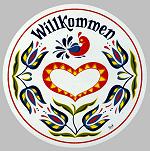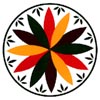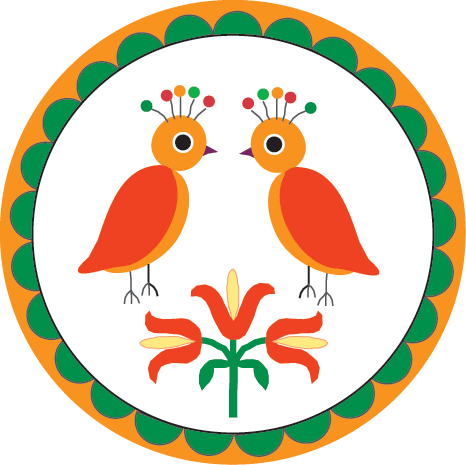
Hex Signs or Barn Signs
Hex signs or “barn signs” are sometimes thought of as symbols
of faith, a faith at times filled with legends and superstitions.
Often found on the barns of Lutherans, Reformed and other
church people, the colorful, geometric designs of hex signs
are a part of the heritage of Pennsylvania Dutch Country.
The heart of Pennsylvania Dutch Country is found in the valleys,
rolling hills and mountains in southeastern Pennsylvania. The
Pennsylvania Dutch people, known today for their thrift, strong
work ethic, deep religious faith and hearty appetites, have in
their history many superstitions.
Joy & Prosperity

Originally religious refugees from the countries bordering the
Rhine, these people; the Amish, Mennonites, Lutherans, Reformed,
Dutch Quakers, French Huguenots and other groups, came to
America seeking the religious freedom promised by William Penn.
The Pennsylvania Dutch emerged from these varied cultures and
religions. And from their culture came a true American folk art
and a wealth of folklore and legend. Though the Amish people
share in this wealth of folklore they do not believe in hexology.
Hex signs are considered much too fancy for this plain sect.
The tulips, the lilies, the pelicans, and the hearts drawn by the
folk artist were not the naturalistic flowers of the field and
birds of the land, but the images created from man’s subconscious
and his love of God. Direct associations existed between these
symbolic designs and literary traditions, hymnals, and the Bible.
The flowers were those in the garden of Paradise.
These images were found tooled into the leather of the family
Bible, on taufscheine (birth certificates), on the illuminated
manuscripts from the Ephrata Cloister (a religious communal
society in Ephrata, PA) and embroidered on linens. They were cast
into the iron stove plates and trivets, pierced into tinware, and
scratched into pottery. Also, hex signs were evident on
tombstones, dower chests and huge bank barns.
Double Distlefink

Today, Pennsylvania Dutch hex symbols and signs can be found
world-wide. Jane Zook Witmer, owner of Jacob Zook’s Hex Shop,
has a thriving business in Paradise, PA, a small village east of
Lancaster City. Zook Witmer sells Pennsylvania Dutch folk art
plaques which are intended to bring luck or strength, fertility
or success, virtue, love or piety to those who display them on a
barn, house or living room wall. Jane Zook Witmer’s father, Jacob
Zook began a study of the brightly painted hex signs in 1942. The
study and art of the designs continues as a family tradition.
For the 50+-page Free Map and Visitors Guide to Pennsylvania
Dutch Country, please phone 1-800-723-8824, 717-299-8901 or
fax 717-299-0470. The Guide includes information on Jacob
Zook’s Hex Shop.
Source: Hexology, the History & Good-Luck Meanings of the Hex
Symbols, Jacob Zook, Paradise, PA
Back To Famous Places & Events Index
Fun Pet Newsletter
Search Our Site for More Cool Info
Pet Care Tips Directory
Really Neat Gift Items for All Pet Lovers
Stuffed Plush Animals
Canine Care Tips
Feline Care Tips
Horse Care Tips
Site Map
Copyright ©
Choose To Prosper